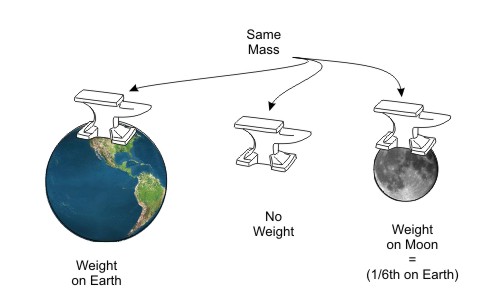Have you every got confused between the words mass and weight? Students and other people with non-science background would find it intriguing to hear these two words in almost the same context. While many people take mass being same as weight, others wonder about the difference between “mass of an object” and “weight of an object”. Let’s find it out!
Definition of Mass
In simple terms, mass is the amount of matter contained in an object. So, the very matter is the mass of an object. Moreover, mass of an object is a constant quantity. It does not change with the change in object’s position or location.
More scientific and accurate definition of mass is given in terms of inertia.
Inertia is the resistance of an object being accelerated when acted on by an external force. As they say, everything in the universe wants to stay at rest. But when an external force is applied, it may being to move. But how much force is required? Well, that depends on the object’s mass! More the mass, more the inertia, more the amount of force required to make a change in its motion.

Definition of Weight
Weight is a measurement of the gravitational force acting on an object. So, technically, weight does not really indicates how much matter is there in a body. It rather indicates the pull of gravity that works on that body. Weight can be measured by multiplying mass with the gravitational acceleration.
W = M x g
Weight on Moon and other Planets
Now we know that weight changes if gravity changes. So, you would certainly wonder about your weight on moon and other planets in the solar system. Here is the list of relative weights on these celestial bodies. If on Earth, your weight is one unit, your weight on other planets would be:
- Relative weight on Mercury: 0.378
- Relative weight on Venus: 0.907
- Relative weight on Earth: 1
- Relative weight on Moon: 0.165
- Relative weight on Mars: 0.377
- Relative weight on Jupiter: 2.364
- Relative weight on Saturn: 0.910
- Relative weight on Uranus: 0.889
- Relative weight on Neptune: 1.125
Difference between Mass and Weight
Following table lists some of the most important differences.
| Mass | Weight |
|---|---|
| Mass is a property of matter. | Weight is a property of gravitational pull. |
| Mass always remain constant irrespective of object’s location. | Weight of an object changes as it moves to an different gravitational field. |
| Mass can be measured by a pan balance, a triple-beam balance, lever balance or electronic balance. | Weight is measured by a spring balance. |
| Mass is a scalar quantity. It only has a magnitude but no direction. | Weight is a vector quantity because it has both magnitude as well as a direction (towards the center of the gravitational pull). |
| Mass is measured in units like grams, pounds, kilograms etc. | Weight is measured in Newtons. |
| Mass of an object can never be zero. | Weight of an object can be zero if the object is placed in zero gravity environment. |
Use the citation below to add this article to your bibliography
"What is the Difference between Mass and Weight?." Dashamlav.com. Web. 13 June 2025. <https://dashamlav.com/difference-mass-weight/>
Dashamlav.com, "What is the Difference between Mass and Weight?." Accessed 13 June 2025. https://dashamlav.com/difference-mass-weight/
"What is the Difference between Mass and Weight?." (n.d.). Dashamlav.com. Retrieved 13 June 2025 from https://dashamlav.com/difference-mass-weight/
